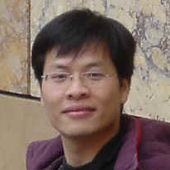
|
Summer school on the topic of deformation in robotics
4-8 Jul 2022 Villeneuve d'Ascq (Lille) (France)
|
|
|
|
Lectures and Keynotes > Day 4 - Control and PerceptionDay 4 - Control and Perception9:00-11:00: Lecture "Primers of Model-Based Soft Robot Control"- "Model-Based Sensing" - Stefan Escaida NavarroAbstract: In this lecture, I will report on the work on model-based sensing for soft robots, which has been the focus of my postdoc at DEFROST. Model-based sensing addresses the challenge of enabling tactile sensing and proprioception for soft robots in a principled way. Using inverse problem solving, the forces/deformations that best explain the observed sensor readings can be found. The first results were obtained with soft pads, which are passive devices. Air chambers are embedded in these devices and changes in volume or pressure are measured by pneumatic sensors. Forces magnitudes and deformations could be estimated using SOFA. However, for estimating contact location, machine learning had to be employed. Therefore, as a follow-up, a multi-modal sensing approach was proposed: contact location is obtained using soft capacitive touchpads and thus interactions can completely be handled by the numerical simulation. Finally, in recent works, it was studied how these approaches can be applied to actuated devices. We have found that these results can be applied to the development of anatomical soft robots, that is, novel medical phantoms having advanced functionality as well as multi-segment soft manipulators.  Bio: Stefan is a postdoctoral researcher at Inria Lille. He received his diploma in computer science (Dipl.-Informatiker) from Karlsruhe Institute of Technology (KIT), Germany in 2010. He obtained his PhD degree (Dr.-Ing.) from the same institution in 2016. He is passionate about tactile and proximity perception in robotics, with interests ranging from sensor design to the applications enabled by them. During his doctoral phase he researched on haptic object recognition and grasping as well as the technology and the applications for capacitive tactile proximity sensors, such as preshaping, collision avoidance and teleoperation. He is currently working on model-based force and shape sensing for Soft Robotics.
- "Workspace Analysis" - Quentin PeyronAbstract: In this lecture, we will talk about the notion of workspace, which is essential to understand when controlling robots. The workspace is the set of end-effector positions or poses (including orientation) that can be reached. I will give an overview of the numerical methods that can be used to compute the workspace, and present their results for different soft robot architectures. An important part of this lecture will also concern the presence of singular and elastically unstable robot configurations, for which the robot loses degrees of freedom or exhibit sudden snapping behaviors. I will give an overview of known singularities and buckling phenomena in soft robotics, and how to predict and manage them.  Bio: Dr. Quentin Peyron is a research scientist at the INRIA institute, working with the DEFROST team. After obtaining an engineering diploma in mechatronics from INSA Strasbourg, and a master in robotics from the University of Strasbourg, he obtained a PhD in robotics from the University of Bourgogne Franche Comté. During his PhD, he worked in co-supervision with the ICube (Strasbourg) and FEMTO-ST (Besançon) laboratories on the modeling, analysis and design of slender and thin continuum robots for minimally invasive surgery. He also collaborated with the MSRL team of ETH Zürich on magnetic continuum robots. He was a Postdoctoral Fellow at the Continuum Robotics Lab of the University of Toronto from 2020 to 2021, where he worked on tendon-driven continuum robots. During his Post-Doc, he received the Post-Doctoral Fellowship Award from the University of Toronto. His research interests are the modeling, design, and control of continuum and soft robots, and the development of eco-designed soft robotics for industrial applications.
- "Model-Based Control" - Gang ZhengAbstract:
 Bio: Gang Zheng received the Bachelor and Master degrees in Communication and systems in 2001 and 2004, respectively, both from Wuhan University, China, and Ph.D. degree in Automatic control from ENSEA/Université de Cergy-Pontoise, Cergy, France, in November 2006. From December 2006 to December 2007, he held a Postdoctoral position in BiPop research team of INRIA Rhône-Alpes, Grenoble, France. From January 2008 to August 2008, he was Postdoctoral researcher in CASYS research team of LJK/CNRS, Université de Joseph Fourier. From September 2008 to August 2009, he was a Teacher-Researcher in ENSEA. He joined INRIA as a permanent researcher from September 2009. Gang Zheng is a senior member of IEEE.
11:30-12:30: Keynote "AI-Based Controllers for Soft Robots" - Egidio FaloticoAbstract: Soft robotic systems have risen at a rapid pace in the last ten years. Due to their flexible, deformable, and adaptive characteristics, soft robots have complex and unpredictable behaviours that affect modelling and control by introducing non-linearities and hysteresis. Since soft robots are made of continuously deformable materials, their full state is governed by continuum mechanics rather than rigid-body dynamics. This results in systems with infinite degrees of freedom. In addition, their dynamics is often highly nonlinear. These properties of soft robots, which simplify low-level control and sensing issues, complicate the high-level planning, control, and modelling of these systems. Machine learning approaches are being used as a valuable solution for the estimation of state representation of soft robots. They represent a valid alternative to manual and pre-programmed behaviours based on analytical models, since the models are estimated through experience while the robot is interacting with the environment. Efforts for the control of soft robots based on machine learning have addressed different levels of encoding of robot models that, in turn, produced different control strategies. This talk will introduce static as well as dynamic models used for the control of soft robots, with a focus on the AI-based methods involved in the control of soft manipulators. The goal is to show the main techniques used, their current limitations and future perspectives.  Bio: Egidio Falotico (male) Dr. Egidio Falotico is currently Assistant Professor with The BioRobotics Institute, Scuola Superiore Sant’Anna (SSSA) in Pisa and serves as head of the BRAin-Inspired Robotics (BRAIR) Lab. He received M.S. degree in Computer Science at the University of Pisa in 2008. He has a PhD degree in BioRobotics (SSSA, Pisa) and a PhD degree in Cognitive Science (University Pierre et Marie Curie, Paris, France)(March 2013). He currently serves as PI in the following EU projects: Human Brain Project (FET Flagship Initiative), Proboscis (FET OPEN initiative) and GrowBot (FET Proactive initiative) . He is author or co-author of more than 70 international peer reviewed papers and he regularly serves as a reviewer for more than 10 international ISI journals. He has been involved in other EU-funded projects (I-SUPPORT, SWARMs, SMART-E, RoboSoM, RobotCub). His main research interests focus on the development of brain inspired algorithms for humanoid robots and machine learning approaches for soft robot control 13:30-14:30: Keynote "Robots with sense of Touch – Towards Embodied Intelligence" - Perla MaiolinoAbstract: Robots operating in dynamic and unstructured environments must exhibit advanced forms of interaction with objects and humans. “Sense of Touch” in robots can play a fundamental role in enhancing perceptual, cognitive and operative capabilities of robots, specifically when they physically interact with objects and humans in the environment. Many solutions to design, engineer and manufacture tactile sensors have been presented for both rigid and soft robots, because the availability of appropriate sensing technologies is the first and necessary step, but the effective utilization of “sense of touch” in robots depends also on the understanding of the tactile perception mechanism and in particular how the interaction between the body and the environment filters the tactile information to simplify the following inference process. The seminar will present technological and research challenges for providing robots (rigid and soft) with sense of touch.  Bio: P. Maiolino received her Ph.D. in Robotics, her Meng in Robotics and Automation and BEng in Software Engineering from University of Genova (Italy). She joined the Mechatronic and Control Laboratory (MACLAB) at the Department of Informatics, Bioengineering, Robotics and System Engineering (DIBRIS) University of Genova where, as PhD student first and then as research fellow, carried out research about new technological solutions for the development and integration of distributed tactile sensors for providing robots with the “sense of touch”. The artificial skin technology (CySkin) which has been objective of her research, has been integrated in several robotics platforms and is part of the blockbuster exhibition “Robots” which has been shown at Science Museum of London in 2017. Before to join Oxford Robotics Institutes in 2018, She worked as Postdoctoral researcher at Biologically inspired Robotics Lab (BIRL) at University of Cambridge where she started to be interested in soft robotics pursuing research in soft robots sensing and perception. Currently She is Associate Professor at Engineering Science Department and member of Oxford Robotic Institute at University of Oxford where she is establishing the ORI Soft Robotics lab. Her research interests and future research objectives are related to the development of new technological solutions for Soft Robots sensors and actuators and to investigate the role of “softness” in Soft Robots perception for achieving autonomy and intelligent behaviours.
|

